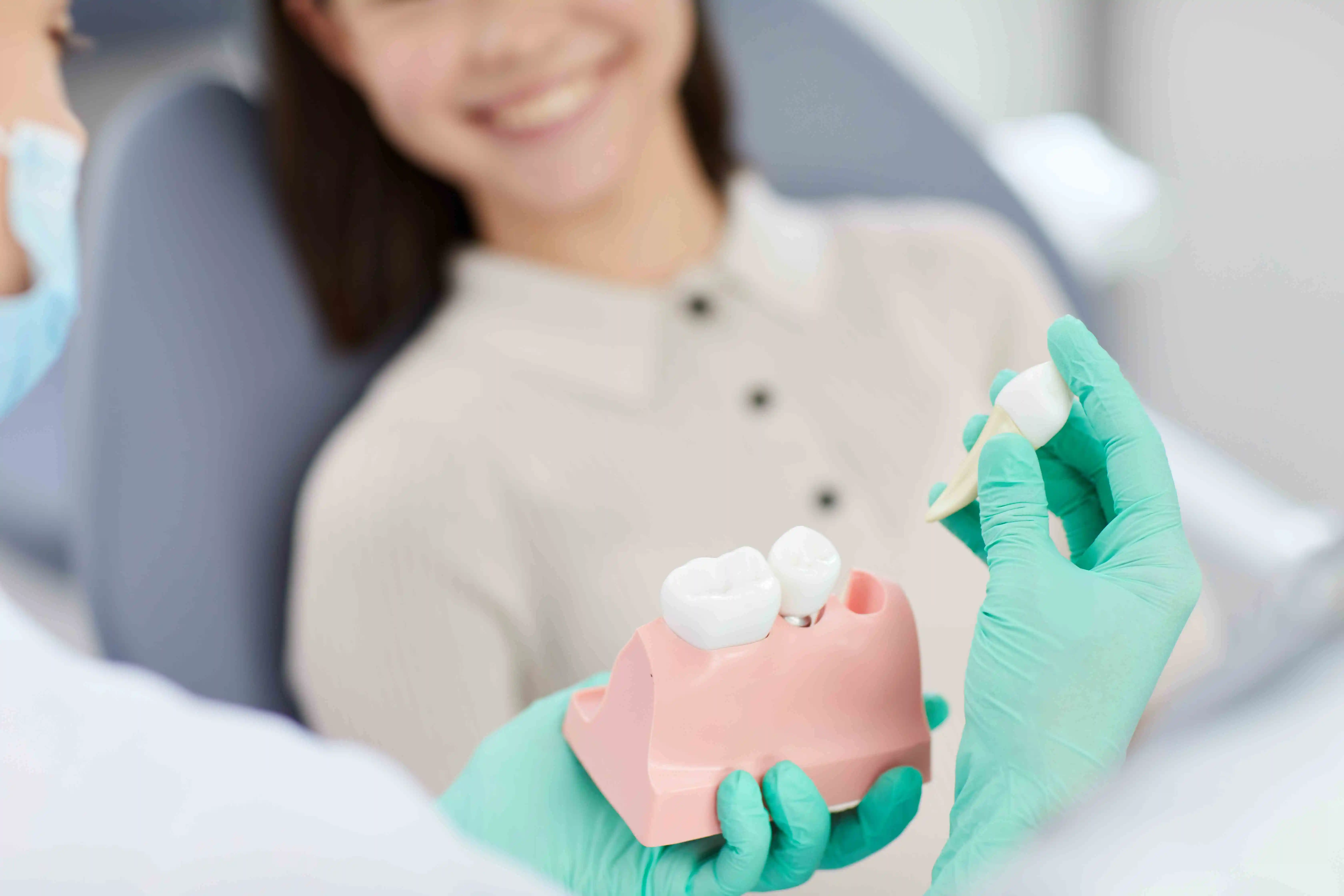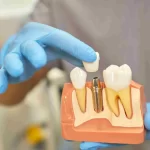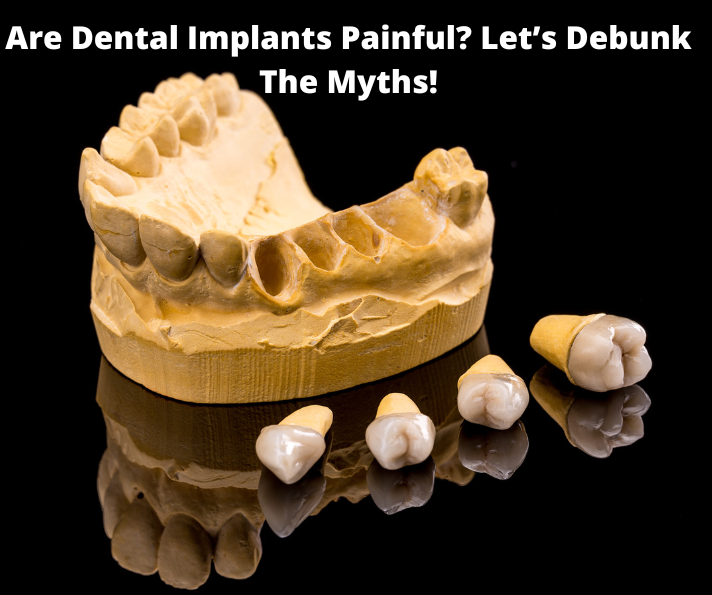Dental implants are an increasingly popular choice for many Americans with missing 1 or more missing teeth. But are dental implants painful? Many have asked this question online, and the answer is not always clear.
In this blog post, we will explore the topic of dental implants and discuss whether or not they are painful.
Since getting dental implants entails conveying titanium screws implanted into your jawbone, it’s almost natural to assume they will hurt. However, that’s not true, as dental implants offer a minimally invasive solution. After all, think you can get a complete set of teeth with all-on-4 or all-on-6 implants. In other cases, you can replace 3 or more missing teeth using just 2 strategically placed implants.
We will show you the advantages of getting dental implants and how to make the process of getting dental implants as pain-free as possible. So, if you are considering dental implants, read this post until the very end to find out, “Are dental implants painful?”
What is a Dental Implant?
A dental implant is an advanced tooth replacement structure that recreates the original tooth structure using 3 main parts:
- A titanium screw is surgically implanted into the jawbone.
- A metal or plastic abutment connects the implant to the crown above the gums.
- A porcelain crown, Dental bridge, or denture resembles your natural tooth or teeth and functions accordingly.
Dental implants frequently replace a single lost tooth or many teeth. Due to advancements in dentistry, most people can benefit from them.
In the case of patients with low jawbone density or inadequate gum tissue to support the metal screws, dentists now recommend bone and gum tissue grafts to help strengthen them for implants.
If taken care of properly, they can last a lifetime and behave, feel, and appear like natural teeth.
What are the Primary Benefits of Dental Implants?

Dental Implants Function Like Healthy Teeth
The ability to chew again correctly is one of the main benefits of dental implants. Most patients cannot distinguish between their implant tooth and their natural teeth after a while. They can clean their teeth, floss correctly, and chew their food like before.
Have a Longer Lifespan Than Any Other Tooth Replacement Techniques
Dental implants can last a lifetime, unlike a dental bridge, which might only last 10 years. The titanium implant fuses with the jawbone and is biocompatible, meaning it won’t harm the body.
Dental Implants Prevent Bone Loss
The lack of stimulation caused by the absence of a tooth causes the jaw bone to deteriorate.
Without an implant, the bone surrounding the missing tooth loses 25% of its volume in the first year after tooth loss and continues over time.
Dentures frequently become loose and then rub against the bony ridge, gradually eroding it. This can even hasten bone loss. An implant stimulates natural bone development since it replaces the tooth’s root and tooth, restoring full functionality.
Dental Implants Stabilize Adjacent Teeth
A missing tooth can leave a gap, leading to the crooked movement of surrounding teeth. It can also impede and make future tooth replacement challenging. Dental implants are great to avoid this and help stabilize your remaining natural teeth.
Dental Implants Prevent Gum Disease
Gum disease can be prevented with dental implants as a gap left by a missing tooth accumulates food and bacteria, causing gum disease.
Dental Implants Can Ward Off Facial Sagging and Premature Aging
An unwelcome side effect of bone loss brought on by tooth loss is facial drooping. The lower part of the face begins to collapse, reducing the space between the chin and the nose tip.
This causes more lines around the mouth, thinner lips, and a sharper chin that can make someone appear much older than their actual age. Getting dental implants on time can help prevent that.
Now that you are familiar with dental implants, let’s answer the question: “Are dental implants painful, and are they worth it?”
Is Dental Implant Surgery Painful?
Dental implant surgery is never painful for most people because of the use of anesthetics. A common misconception among patients is that they should never feel discomfort when having work done on their teeth.
However, there are times when certain types of numbing agents might not offer enough relief because it doesn’t affect all parts of someone’s mouth equally (such as nerves).
Local anesthesia prevents you from feeling pain during dental implant surgery, but general or regional anesthesia may be necessary in some cases. Your oral surgeon can explain all your options before starting this major procedure!
Are Dental Implants Painful Post-Surgery?
Dental implant surgery is a procedure that requires some degree of pain management. Generally speaking, you should not be feeling any pain during your dental implant surgery, but you may feel post-operative discomfort and soreness, but it shouldn’t last more than a few days.
The pain from a dental implant surgery should not last more than a few days. When the local anesthetic from the surgery wears off, the discomfort may become more intense. You may experience it near where the surgery was done, and its severity will depend on how much local anesthesia you received beforehand.
Are Dental Implants Painful: Tips for a Quicker Recovery
After your surgery, the discomfort will peak within about 3-5 days and then begin to subside relatively quickly. By the end of the first week, you should be feeling little or no pain while chewing food again! Swelling, bruising, and inflammation should also start dissipating steadily from hours after placement during the healing process, which can take up to 1 -2 weeks, depending on how fast someone is recovering.
The recovery time depends from person to person. It depends on many factors, including the age of the patient, whether or not a person drinks alcohol and the patient’s overall health. The better your body reacts to post-surgery medications, the quicker your body recovers, and the sooner you can resume your daily activities.
Experiencing Pain Even After 2 Weeks? See a Dentist Immediately!
If you are experiencing pain lasting more than two weeks or worsening, please see your dentist. It isn’t typical to experience this kind of discomfort long after the procedure.
It is possible to have ongoing post-surgical issues with teeth in many cases. Still, if it continues past the average healing time, something may be wrong, and you need a proper evaluation from a dentist!
Aftercare Tips to Reduce Post-Surgical Complications
If you are still pondering, “Are dental implants painful?” Just know that you need to follow the instructions shared by your dentist for post-operative care to a T.
Here are a few specific measures to minimize discomfort and accelerate the healing process following dental implants:
- Gently rinsing with lukewarm saltwater on a routine basis may help to eliminate germs and accelerate recovery.
- Do not use straws for the first few days as the suction pressure can dislodge the clot from the extraction site and lead to a severe condition called “Dry Socket.”
- Stay away from sticky and crunchy meals to prevent infection for the initial 2 weeks. Stick to a liquid diet for the first 48 hours at least.
- Avoid alcohol and smoking for at least 10 days post surgery for even quicker healing, as consumption of these may prolong the recovery phase.
- Gently brushing using a soft-bristled toothbrush is advised post-implant surgery to avoid plaque buildup.
- After the procedure, strictly adhere to the dentist’s post-operation recommendations. As part of the instructions, you can be told to take painkillers like Advil or Tylenol as recommended and, if necessary, prophylactic antibiotics.
- Apply cold compresses to regulate post-surgical pain.
Are You Looking for Dental Implants Specialists in Minneapolis, MN? Contact MPLS Dental Today!
If you’re still wondering, “Are dental implants painful?” Our implant experts at MPLS Dental will be more than happy to answer your questions on the phone or in person during a consultation.
Do you reside in Minneapolis or nearby areas in Minnesota and want a complication-free dental implant treatment? Trust no one other than Dr. Hodd of MPLS Dental, as she is the best in business with more than 30+ years of experience and our highly proficient and skilled staff. Contact us or visit our website to learn more.


















